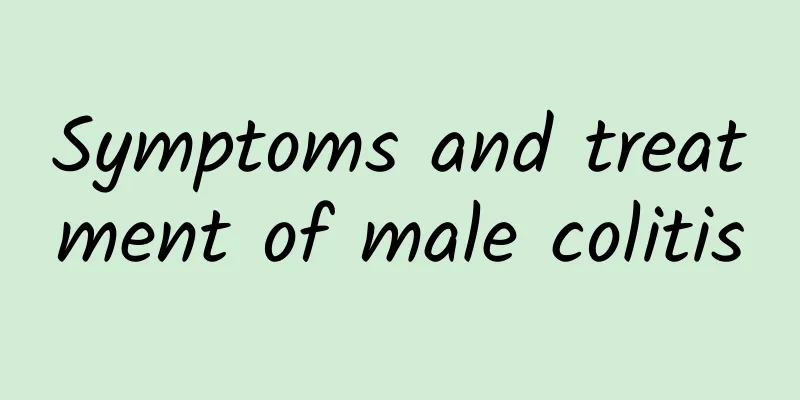Symptoms and treatment of male colitis

|
If a person's diet is not reasonable or the stomach is cold, it is easy to have some gastrointestinal diseases. The human stomach and intestines also have a very complex structure. There is a section of intestine between the rectum and the cecum called the colon. I believe everyone is familiar with the gastrointestinal disease of colitis. It is the most common disease of the colon. So if a man suffers from colitis, what are its symptoms? What are the symptoms of male colitis? The most common symptom of colitis is usually diarrhea. If the patient is mild, he or she may have diarrhea 3 to 4 times a day, usually with soft stools. If the patient is more serious, the frequency of diarrhea may reach 10 times, and there may also be symptoms of constipation. Patients with colitis generally have symptoms of abdominal pain. Mainly, there will be paroxysmal pain in the right lower abdomen or lower abdomen. If the patient has severe colitis, he or she will find that the entire abdomen is painful. Patients with colitis may also have symptoms of constipation. Some patients generally have a bowel movement only once every 4 to 5 days. Patients generally will not have a bowel movement if they do not take laxatives. There may also be blood in the stool during bowel movements. Severe patients bleed more, and the patient may even have symptoms of shock. Some patients will also experience weight loss, fatigue, dreaminess, fear of cold, etc. Other patients will experience anemia and nutritional disorders, a series of complications. The above detailed introduction to some common clinical symptoms of colitis, I hope it will be helpful to us. Colitis seriously affects the quality of life of patients, so they must go to the hospital for treatment. At present, the treatment of colitis is generally based on clinical symptoms. Colitis has the characteristics of recurrent attacks, so the treatment time will be longer. It is best to choose a regular hospital for treatment. Patients should eat some light and easily digestible food, and avoid contact with irritating food. Finally, I remind my friends that they must pay attention to personal dietary hygiene in daily life to avoid colitis. What are the treatments for colitis? If colitis is not completely cured, it may recur at any time. Patients must strictly follow the treatment principles during treatment. (1) Diet: Get enough rest and avoid fatigue and excessive mental stress. Give the patient a low-irritation, easily digestible, nutritious diet. Try to avoid foods containing rough fiber. Temporarily avoid eating milk and dairy products. Supplement fluids and electrolytes appropriately, and supplement vitamin B and calcium. Take iron supplements and folic acid to treat anemia. Patients with severe conditions, frequent diarrhea, and severe malnutrition can be given a temporary gastrointestinal elemental diet or parenteral nutrition. (2) Anti-infective drugs: Salicylic acid sulfazopyridine is effective in treating various types of colitis and preventing complications. Some drugs may cause nausea, vomiting, headache, rash, granulocytopenia, anemia, and liver dysfunction. If it is ineffective or has adverse reactions, metronidazole can be used instead. Neomycin and phthalosulfathiazole are also effective. (3) Hormone therapy: Adrenal corticosteroids, hydrocortisone and prednisone can improve the general condition, relieve the course of the disease, reduce the number of defecation, reduce recurrent symptoms and increase appetite. However, some patients do not respond well and may cause ulcer perforation, bleeding and slow healing. It is now believed that the scope of application is relatively small. For patients with acute outbreaks or severe early attacks, it can significantly reduce symptoms and improve the condition; but the effect is not satisfactory for long-term recurrent attacks. Corticotropin units are dissolved in glucose solution and intravenously dripped. After the symptoms improve, intramuscular injection is used instead. Hydrocortisone is injected intravenously, and the dosage is gradually reduced after the symptoms are relieved. It can be given. Corticosteroids are better than cortisone at relieving symptoms, but they are not as effective as cortisone at maintaining relief. This treatment should not be continued for more than 2 weeks if there is no improvement in symptoms. (4) Immunosuppressive drugs: Azathioprine, once a day, can change the course of the disease and suppress clinical manifestations, but cannot change the underlying disease. It is often used to reduce recurrences during the quiescence period, but it may also cause poisoning, so be careful. 6-Mercaptopurine (6-MP) combined with hormones can alleviate symptoms. (5) Antidiarrheal drugs: They can reduce the frequency of defecation and relieve abdominal pain. Compound diphenoxylate, codeine and compound camphor tincture are commonly used. Antidiarrheal drugs may cause toxic megacolon in acute ulcerative colitis and should be used with caution. Sedatives and anticonvulsants can also be given. (6) Retention enema: commonly used for rectal and sigmoid colitis, it can relieve symptoms and promote ulcer healing. (7) Treatment with Chinese medicine: The fundamental treatment should be to strengthen the spleen and kidney, replenish qi and remove dampness, and the symptomatic treatment should be to clear away heat and detoxify, and to activate blood circulation and remove blood stasis. Treatment should be based on syndrome differentiation. Long-term use of bitter and cold medicines is the most taboo. It can also be combined with Chinese medicine injections and other intravenous drips to strengthen the body. Chang'an Baicao (available on Taobao) is made from nutmeg, amomum villosum, hawthorn, polygonatum, sea buckthorn, longan meat, yam, ginseng, coptis root, and psoralea corylifolia. It can eliminate symptoms such as lower abdominal pain, blood in the stool and diarrhea, restore bowel movements to normal, enhance the body's immunity, strengthen the body, and prevent recurrence. Usage and dosage: 3 grams at a time, 3 times a day, taken with warm water before meals. Warm reminder: It is recommended to use Chinese medicine for treatment. Western medicine only treats the symptoms but not the root cause. Chinese medicine in our country has a history of thousands of years, which is a reflection of strength and experience. Western medicine treatment is very harmful, and often relapses after recovery. Chinese medicine uses food instead of medicine, and treats diseases with nourishment. When the disease is cured, the body will also be healthy. |
<<: Prostatitis symptoms discharge
>>: Is it possible that my boyfriend’s poor eyesight is hereditary?
Recommend
What are the dangers of true foreskin hyperplasia in adults?
Phimosis is a disease suffered by many men. Accor...
Is it easy to treat men's kidney deficiency? How to treat it?
The problem of kidney deficiency cannot be ignore...
Why do you feel tired at work? What are the common reasons for feeling tired at work?
Most people have complained about how tiring and ...
What should you not eat if you have allergies? These are common sense that men must know
In daily life, improper diet can easily lead to a...
What to do if you have testicular effusion?
Some readers may have heard of the symptom of hyd...
Are enlarged underwear effective?
In order to make their penis longer, many men oft...
What is the problem of split urine and foam?
If forked urine and foamy urine are symptoms, the...
Prostate image
The larger actual human organ among the male repr...
Penis glans is too large
The glans penis, also known as the glans penis, r...
For wind-heat cold and fever, correct treatment and care are very important!
Wind-heat cold, as the name suggests, is a cold c...
Why is sperm salty?
When the relationship between two people develops...
Picture of scab after circumcision surgery
For male friends, excessive foreskin or long fore...
What are the causes of testicular pain?
If men do not take good care of themselves, their...
Five elements for men to protect their kidneys
As a man, the importance of kidneys is self-evide...
What to do if you have no sexual interest in your wife
Sex is a common thing, but it is also a factor th...









